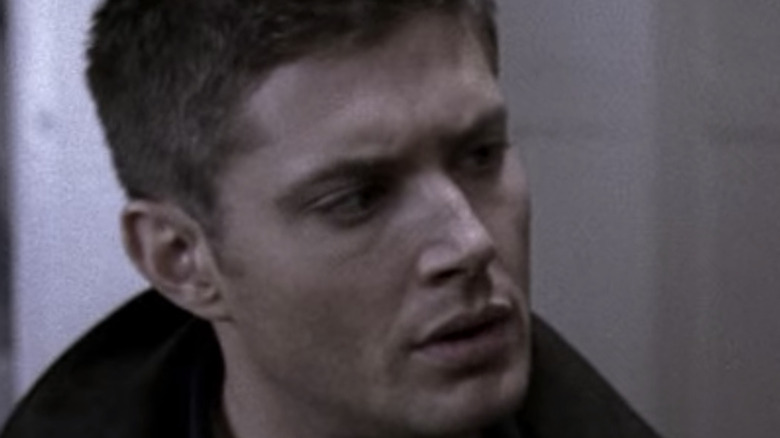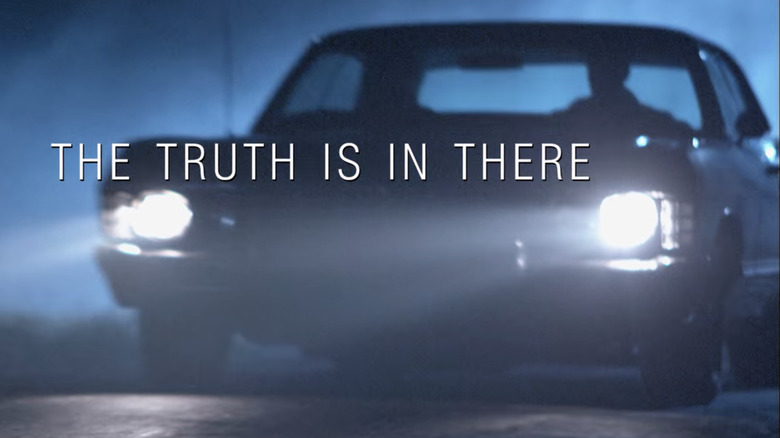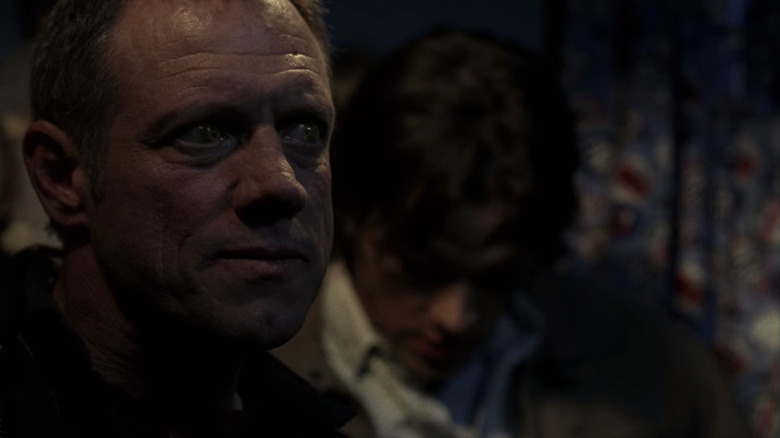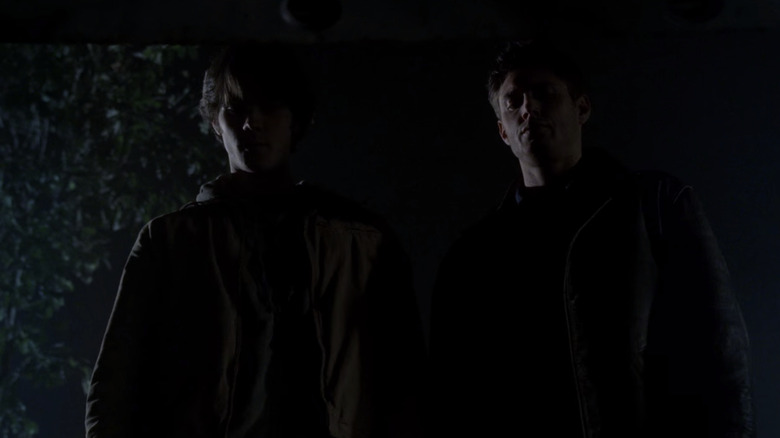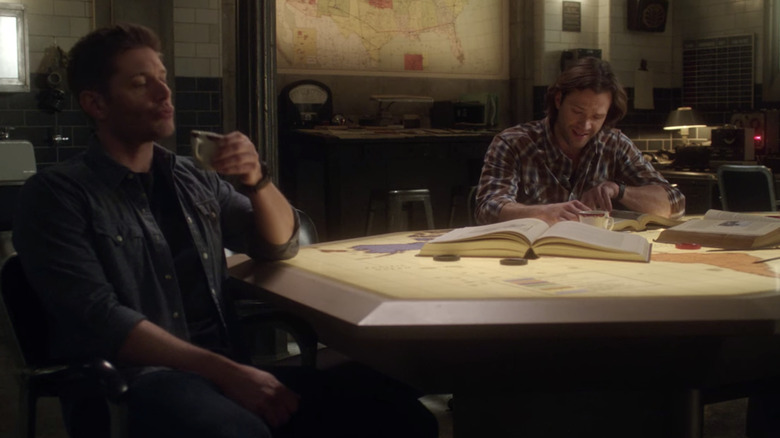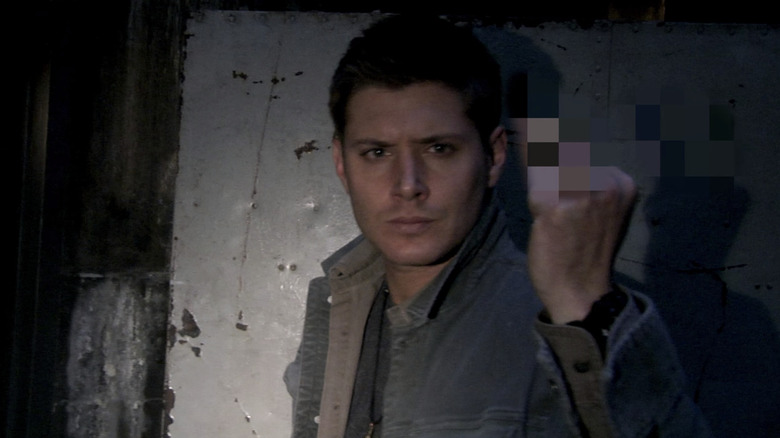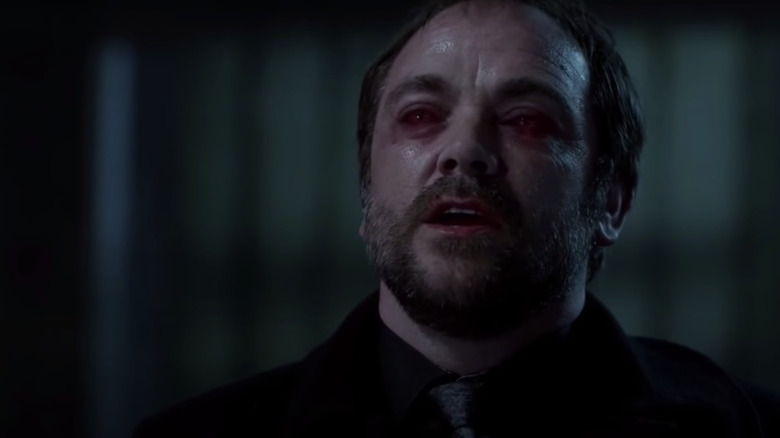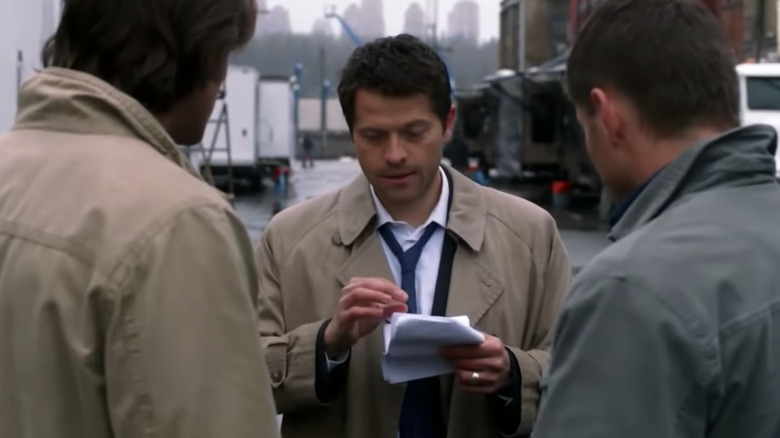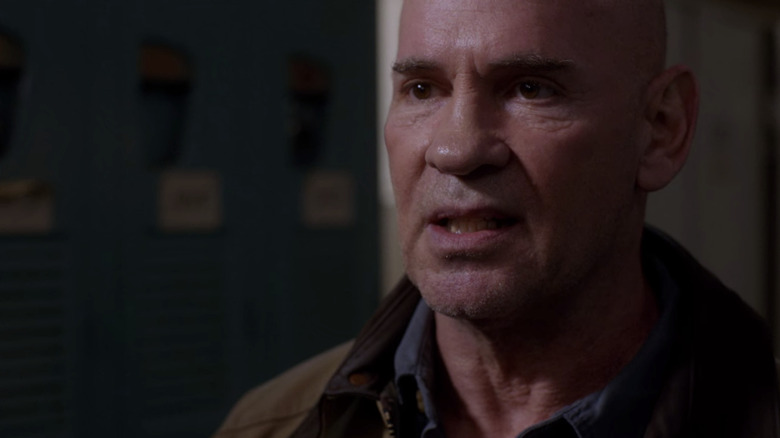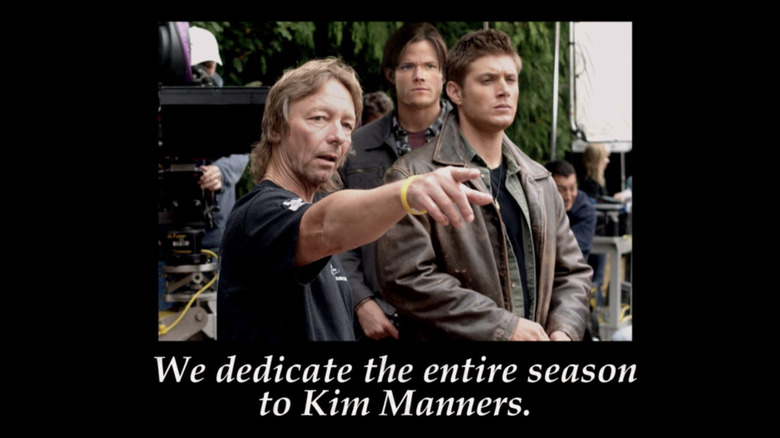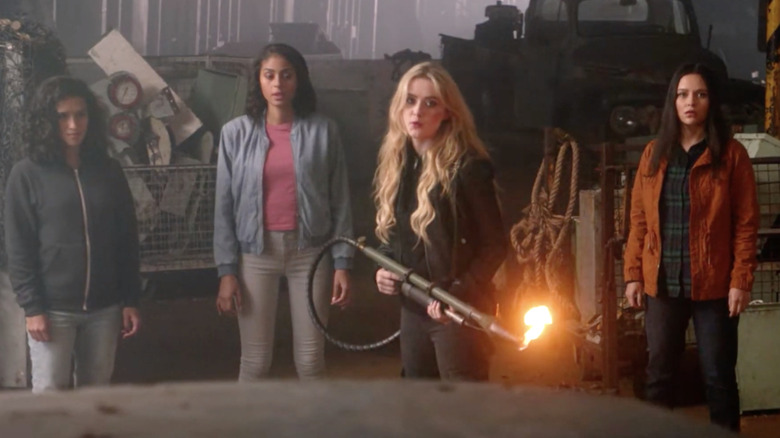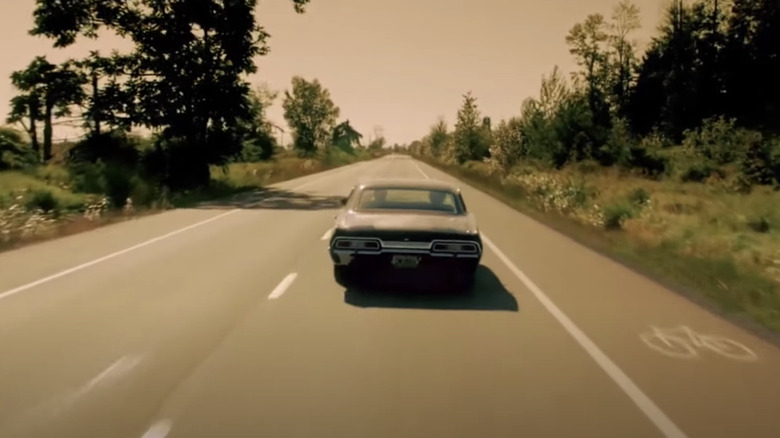Ways That Supernatural Stole From The X-Files
As two of the most beloved (and longest-running) American sci-fi/fantasy shows, "The X-Files" and "Supernatural" have made their mark on television and pop-culture history. Both shows deal with the paranormal and the unexplained, and both became unexpected cult hits for series creators Chris Carter ("X-Files") and Eric Kripke ("Supernatural").
"The X-Files" ran for nine seasons (with over 200 episodes), spawned two feature films and a spin-off ("The Lone Gunmen"), and eventually returned for two shortened "event" seasons in 2016. "Supernatural," on the other hand, ran for 15 full seasons (and 327 episodes), with a potential prequel spin-off in development.
"The X-Files," led by FBI Special Agents Fox Mulder (David Duchovny) and Dana Scully (Gillian Anderson), took a more scientific approach, thanks largely to Scully, a former medical doctor who begins the show certain that seemingly supernatural phenomena have rational explanations. Over on "Supernatural," brothers Sam (Jared Padalecki) and Dean Winchester (Jensen Ackles) acted as if just about every paranormal being (besides Bigfoot) was real—they just looked a bit different than we might've thought.
While the latter series had a different style from the former, it still took a lot of cues from Mulder and Scully's playbook. Here are some of the biggest ways that "Supernatural" stole from "The X-Files" over the years.
That iconic intro
The main "Supernatural" intro is just a title card that changes each season, which is very different from the "The X-Files" opener, with its bizarre (and slightly dated-looking) imagery and famous theme song. What we're talking about is specific to one episode.
In the Season 6 episode "Clap Your Hands If You Believe," which is a clear homage to "The X-Files" from the get-go, Sam and Dean take a UFO abduction case, but it turns out that there aren't any aliens involved. Instead, they discover that fairies are actually the ones behind the international UFO phenomena, taking people to their alternate dimension rather than some extraterrestrial plane. The episode, one of the season's best, features Dean getting abducted only to be forced to microwave a real-life Tinkerbell.
Unlike most episodes of the show, "Clap Your Hands If You Believe" opens with a traditional TV intro very reminiscent of "The X-Files" opening credits, just without the eerie whistling music. Replacing the familiar "The Truth Is Out There" slogan with "The Truth Is In There," the episode quickly sheds its "X-Files" references once the fairy theory is introduced. Still, the episode is a fun homage to the series that helped inspire "Supernatural" in the first place. If anyone has the right to succeed Mulder and Scully, it's Sam and Dean.
Expertly balancing MOTW and mythology stories
While the UFO/alien conspiracy angle is what initially sold "The X-Files" as a compelling long-term series, the show didn't, and couldn't, constantly shove the Syndicate conspiracy down viewers' throats. Instead, the series balanced monster-of-the-week (MOTW) stories and "mythology" stories that contributed to the overarching series plot. As "The X-Files" continued, Mulder and Scully made their way through plenty of fascinating cases. Only 73 of the series' total 218 episodes actually had to do with the show's mythology, with the rest being standalone MOTW episodes. "The X-Files" was groundbreaking television that proved that genre shows could thrive and paved the way for "Supernatural."
"Supernatural" originally followed a similar formula. Most episodes of the first few seasons are MOTW one-offs, with a few mythology episodes peppered in to keep the broader plot rolling. This method worked well. As the series progressed, however, the mythology became so personal to the Winchesters that nearly every episode ended up having some sort of connection to the master plot (which, honestly, was pretty exhausting); if not through Sam and Dean, then through other characters, such as the angel Castiel, the demon Crowley, or the nephilim Jack. Still, there's no doubt "Supernatural" picked up its basic structure from "The X-Files."
Main characters driven by a loss connected to the overall mythology
In "The X-Files," it doesn't take long for Mulder to tell Scully exactly why he's interested in the paranormal and the unexplained: his younger sister, Samantha, was abducted by aliens when they were kids (on his watch no less), and she never returned. Working his way through the FBI's violent crimes unit, Mulder eventually rediscovered the X-Files before being partnered up with our favorite agent/doctor. Mulder's search for his sister drives him for the first seven seasons of the series as he uncovers the Syndicate's diabolical plans for global domination by alien forces. Needless to say, if Samantha Mulder hadn't been abducted, there'd be no "X-Files."
Similarly, "Supernatural" begins with a dark family tragedy: the death of Mary Winchester. This event haunted Sam and Dean's father John, who became a hunter of all things supernatural, hoping to find the thing that killed his wife and take his revenge. In the "Pilot," Sam's girlfriend Jess is also killed by the Yellow-Eyed Demon, giving him a reason to return to a life of hunting ghosts, monsters, and demons with his brother. Had the events spoken of here not occurred, the Winchesters' lives would've been incredibly different. While the specifics of the events are distinct, the backstories give both of the shows their raisons d'être.
One partner is a nerdy researcher while the other is a traumatized goofball
For a show like "The X-Files" or "Supernatural" to work, the partners can't have similar personalities. Without differences to drive tension, both shows would've lost most of their storytelling potential.
In "The X-Files," Mulder is a believer, the overly enthusiastic driving force who searches for the truth because it's personal. His sister's abduction messed him up, and instead of dealing with it, he uses deflective humor and paranormal investigations to keep himself afloat. Sound familiar? That's because it's Dean Winchester's whole schtick. Thanks to enormous personal losses, a rocky childhood, and various tragedies of a more recent vintage, all Dean does is hunt, drink, and joke to cope with his life. Essentially, he's the Mulder of "Supernatural."
While Mulder is no intellectual slouch—he "graduated top of his class at Oxford," as one episode puts it—Scully is the brainy one. She has a background in a challenging field outside of law enforcement and a religious faith that keeps her going when things don't make sense. Scully is Mulder's rock; without her, he can't function, even if she could live without him. Enter Sam Winchester, who fits this profile to a T. Unlike Dean, who was never much of a student, Sam graduated from Stanford and considered becoming a lawyer until Dean roped him back into the family business. Sam can live without Dean, and he often has. Sam also held a private faith himself, admitting in "Houses of the Holy" that he prayed every single day.
Dean even called it way back in Season 1. It seems that the "Supernatural" writers simply re-worked the "X-Files" duo from FBI partners to brothers, but we're not complaining.
They often tell the same stories (and use the same monsters)
There are plenty of "X-Files" episodes that ended up being "remade" into "Supernatural" episodes as the latter series began to air. There are obvious ones, like how both "Supernatural's" "Monster Movie" and "The X-Files'" "The Post-Modern Prometheus" are black-and-white parodies/homages to the Universal Classic Monsters films. There are also some subtler adaptations of "X-Files" episodes, like how "Hollywood Babylon," "The Monster at the End of the Book," and "Fan Fiction" took ideas directly from "Hollywood A.D." and ran with them. Of course, "The X-Files" isn't the only show that "Supernatural" mimicked, parodied, or honored over the years, but it was certainly their most frequent.
Other prime examples include the "Cops"-themed "X-Files" episode "X-Cops" being spiritually succeeded by "Supernatural's" "Ghost Hunters" parody "Ghostfacers," the "X-Files" mystery "Demons" being remade as "Supernatural's" "Born Under a Bad Sign," and the hilarious Mulder/Scully retelling of "Bad Blood," which was mimicked by the Winchesters in "Tall Tales." Oh, and let's not even mention how the infamous "Home" was retooled for "Supernatural" via the episode "Family Remains." Of course, there are plenty of others out there that you can read about on this Reddit forum, but these are some of the most direct offenders. Interestingly enough, "Supernatural" in turn influenced "The X-Files" revival, with the episode "Familiar" referencing salt circles to protect folks from evil spirits.
Each has recurring villains who just can't stay dead
Mulder and Scully made quite a few enemies. From some recurring monsters of the week to alien conspiracists and government stooges, they were ticking people off left and right. Throughout the 11 seasons of "The X-Files," there were a few villains stuck around a lot longer than they should've. Whether it was the Alien Bounty Hunters, Alex Krycek, or William B. Davis' Cigarette Smoking Man (CSM) himself, there was always a familiar enemy around to ruin our beloved agents' day. Oftentimes, these characters seemed immortal, like permanent staples of the show who would never go away.
"Supernatural" had a similar problem, but it was arguably a lot worse than anything on "The X-Files." Between the demons Crowley and Meg, the reaper Billie, the angel Naomi, and the Devil himself (not to mention a roster of others that only grew longer as the series continued), the Winchesters could never seem to keep their foes down. Even when Dean finally killed Lucifer in Season 13 (years after they originally caged him in Season 5), the Devil still returned from the grave in the show's penultimate episode, resurrected to haunt the Winchesters again. Actually, that's kind of like how the CSM returned in the "X-Files" revival series to haunt Mulder and Scully... maybe he is the Devil after all.
Both were (mostly) shot in Vancouver
Rainy Vancouver was home for "The X-Files" for the show's first five seasons (and the more recent revival seasons) before production moved to Los Angeles at the behest of David Duchovny for Seasons 6-9. If you pay close attention, you might realize that some of the forested areas, urban developments, and middle-of-nowhere holes-in-the-wall from both shows look a bit familiar. "The X-Files" and "Supernatural" didn't just share filming locations in Canada; they also both shot in Los Angeles as well. Well, technically only the "Pilot" for "Supernatural" was shot in Los Angeles, but that one episode is still worth mentioning here since it's one of the best to come out of the business.
In the two shortened revival seasons of "The X-Files," the crew returned to Vancouver. In the "Supernatural" Season 13 episodes "The Bad Place" and "Wayward Sisters," as well as "The X-Files" revival episode "Ghouli," each show's main cast members investigate the same boat. The shows themselves don't crossover (sadly), but the same Queen of Sidney location was used in each as a place of distinct paranormal interest. Ironically, "The X-Files" episode shot at this location aired a year after "Supernatural" used it, so this time Mulder and Scully copied Sam and Dean's homework rather than the other way around.
Many X-Files stars made their way onto Supernatural
Since both shows were filmed in Vancouver, it was inevitable that some "X-Files" alumni would make their way over to "Supernatural" at some point or another. While a complete list of cast members who appeared on both can be found here, there are a few big "X-Files" stars who stick out. The biggest, of course, is Mitch Pileggi. On "The X-Files," he played Mulder and Scully's boss, Assistant Director Walter Skinner, who quickly became a fan favorite. On "Supernatural," he played Sam and Dean's maternal grandfather, Samuel Campbell, in Season 4's "In the Beginning..." and in a recurring capacity in Season 6. Other "X-Files" actors to appear on "Supernatural" included William B. Davis (the CSM himself), who played a turncoat college professor in Season 1's "Scarecrow"; Nicholas Lea (Alex Krycek), who played Detective Elliot Ness in the time-traveling epic "Time After Time"; and Steven Williams (who played Mulder's informant Mr. X), who recurred as hunter Rufus Turner.
Some of the most beloved "Supernatural" characters were played by actors who made one-time or even minor recurring appearances on "The X-Files," but the biggest three are Jim Beaver (Bobby Singer on "Supernatural"), who played a coroner in "Field Trip"; Mark A. Sheppard (Crowley), who was a villain in the Season 1 episode "Fire"; and Mark Pellegrino (Lucifer), an antagonist in the very disturbing "X-Files" episode "Hungry." Other "X-Files" alumni who showed up big on "Supernatural" include Fredric Lehne (Azazel), Amanda Tapping (Naomi), Nicki Aycox (Meg), A.J. Buckley (Ed Zeddmore), and Titus Welliver (War).
The shows shared crew members, too
The shows shared off-camera talent, too. Some of the most important members of "The X-Files" crew continued on to "Supernatural" after the show's original run ended in 2002. When "Supernatural" started up again in 2005, these writers and directors jumped at the chance to work on another paranormal series. Of course, the most beloved crew member from both series is undoubtedly Kim Manners, who directed 52 episodes of "The X-Files" (nearly a quarter of the series) before directing 16 episodes of "Supernatural" and serving as one of the show's initial producers. Manners sadly passed away during "Supernatural's" fourth season, and the entire season was dedicated in his memory in the episode "Death Takes a Holiday." When "The X-Files" was revived in 2016, his old cohort wasted no time in paying tribute to their most prolific director as well.
But Manners wasn't the only "X-Files" crew member to continue onto "Supernatural." "The "Pilot" and "Wendigo" director David Nutter had directed 15 episodes of "The X-Files" previously. Other directors, such as Rod Hardy, Tony Wharmby, and Assistant Director Kevin Parks also contributed to both shows during their respective runs. "X-Files" writer and producer John Shiban also wrote and produced the first few seasons of "Supernatural," penning some of the best episodes of those seasons. If "Supernatural" proved anything about "The X-Files," it's that if it ain't broke, there's no need to try and fix it.
Both attempted spin-offs that had to be finished on the main show
During "The X-Files" fourth season, Chris Carter launched a sister series called "Millennium" that happened to be a bit darker, with a conspiracy that dealt more with eschatological secret societies than alien invasions. The series ran for three seasons (and crossed over into "X-Files" territory more than once) before being canceled. Rather than drop the show completely, the story was finished out in the iconic "The X-Files" episode also titled "Millennium." A few years later, Carter's first true "X-Files" spin-off titled "The Lone Gunmen" aired, but sadly ended after only 13 episodes. The series officially concluded in "The X-Files" Season 9 episode "Jump the Shark," which effectively killed off the main cast.
"Supernatural" went through something similar, except most of their spin-offs didn't get as far off the ground. The "Ghostfacers" web series saw the fan-favorite paranormal investigators continue their mission, but it only ran for a single season. They eventually returned years later in the "Supernatural" episode "THINMAN," though they'd never be seen again. After another failed spin-off attempt in Season 9 (that was never resolved), "Supernatural's" final attempt at a spin-off came in Season 13's "Wayward Sisters." This episode united a group of teenage girls to fight monsters in Sioux Falls. While the CW didn't pick up this series either, their arc was concluded in the subsequent two seasons of "Supernatural," much like how "X-Files" handled "The Lone Gunmen."
Both may have gone on a little too long originally
You know a series has gone on too long when one of your main stars decides to leave the show. This is what happened after Season 7 of "The X-Files," when series star David Duchovny left the series, appearing in a recurring capacity in Season 8 and only returning for Season 9's two-part series finale "The Truth." Thankfully, Gillian Anderson stuck around, but after two revival seasons in the 2010s, even she has decided that "enough is enough." Season 8 really changed the landscape of the series, and Season 9 was most fans' least favorite season due to the serious dearth of Mulder. Many believe "The X-Files" overstayed its welcome, which has been a common criticism of "Supernatural" as well.
Fifteen seasons is a long time for any series, but especially for one that really peaked in its fifth. After Sam and Dean overcame the biblical Apocalypse, many viewers weren't sure where they could go next. Of course, multiple apocalypses, cosmic deities, and alternate worlds became the natural progression. This was usually enough to keep audiences engaged, but the longer the show went on, the more the mythology changed and the show's continuity was ignored. Many believe that the series should've ended with Season 5, as series creator Eric Kripke's original story ended there. Others argue that the show was great throughout. Whatever side you chose, it's clear that both "The X-Files" and "Supernatural" have this debate in common.
